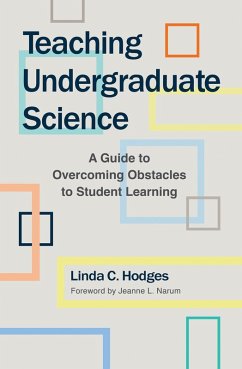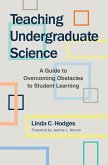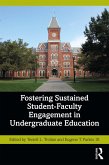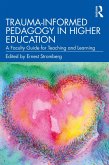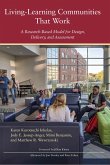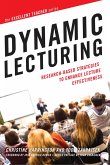Linda C. Hodges
Teaching Undergraduate Science (eBook, ePUB)
A Guide to Overcoming Obstacles to Student Learning
32,95 €
32,95 €
inkl. MwSt.
Sofort per Download lieferbar

16 °P sammeln
32,95 €
Als Download kaufen

32,95 €
inkl. MwSt.
Sofort per Download lieferbar

16 °P sammeln
Jetzt verschenken
Alle Infos zum eBook verschenken
32,95 €
inkl. MwSt.
Sofort per Download lieferbar
Alle Infos zum eBook verschenken

16 °P sammeln
Linda C. Hodges
Teaching Undergraduate Science (eBook, ePUB)
A Guide to Overcoming Obstacles to Student Learning
- Format: ePub
- Merkliste
- Auf die Merkliste
- Bewerten Bewerten
- Teilen
- Produkt teilen
- Produkterinnerung
- Produkterinnerung

Bitte loggen Sie sich zunächst in Ihr Kundenkonto ein oder registrieren Sie sich bei
bücher.de, um das eBook-Abo tolino select nutzen zu können.
Hier können Sie sich einloggen
Hier können Sie sich einloggen
Sie sind bereits eingeloggt. Klicken Sie auf 2. tolino select Abo, um fortzufahren.

Bitte loggen Sie sich zunächst in Ihr Kundenkonto ein oder registrieren Sie sich bei bücher.de, um das eBook-Abo tolino select nutzen zu können.
This book is written for all science or engineering faculty who have ever found themselves baffled and frustrated by their undergraduate students' lack of engagement and learning.
- Geräte: eReader
- mit Kopierschutz
- eBook Hilfe
Andere Kunden interessierten sich auch für
![Teaching Undergraduate Science (eBook, PDF) Teaching Undergraduate Science (eBook, PDF)]() Linda C. HodgesTeaching Undergraduate Science (eBook, PDF)32,95 €
Linda C. HodgesTeaching Undergraduate Science (eBook, PDF)32,95 €![Facilitating Seven Ways of Learning (eBook, ePUB) Facilitating Seven Ways of Learning (eBook, ePUB)]() Bridget D. ArendFacilitating Seven Ways of Learning (eBook, ePUB)35,95 €
Bridget D. ArendFacilitating Seven Ways of Learning (eBook, ePUB)35,95 €![Keeping Us Engaged Online (eBook, ePUB) Keeping Us Engaged Online (eBook, ePUB)]() Christine HarringtonKeeping Us Engaged Online (eBook, ePUB)35,95 €
Christine HarringtonKeeping Us Engaged Online (eBook, ePUB)35,95 €![Fostering Sustained Student-Faculty Engagement in Undergraduate Education (eBook, ePUB) Fostering Sustained Student-Faculty Engagement in Undergraduate Education (eBook, ePUB)]() Fostering Sustained Student-Faculty Engagement in Undergraduate Education (eBook, ePUB)42,95 €
Fostering Sustained Student-Faculty Engagement in Undergraduate Education (eBook, ePUB)42,95 €![Trauma-Informed Pedagogy in Higher Education (eBook, ePUB) Trauma-Informed Pedagogy in Higher Education (eBook, ePUB)]() Trauma-Informed Pedagogy in Higher Education (eBook, ePUB)35,95 €
Trauma-Informed Pedagogy in Higher Education (eBook, ePUB)35,95 €![Living-Learning Communities That Work (eBook, ePUB) Living-Learning Communities That Work (eBook, ePUB)]() Karen Kurotsuchi InkelasLiving-Learning Communities That Work (eBook, ePUB)34,95 €
Karen Kurotsuchi InkelasLiving-Learning Communities That Work (eBook, ePUB)34,95 €![Dynamic Lecturing (eBook, ePUB) Dynamic Lecturing (eBook, ePUB)]() Christine HarringtonDynamic Lecturing (eBook, ePUB)28,95 €
Christine HarringtonDynamic Lecturing (eBook, ePUB)28,95 €-
-
-
This book is written for all science or engineering faculty who have ever found themselves baffled and frustrated by their undergraduate students' lack of engagement and learning.
Dieser Download kann aus rechtlichen Gründen nur mit Rechnungsadresse in A, B, BG, CY, CZ, D, DK, EW, E, FIN, F, GR, HR, H, IRL, I, LT, L, LR, M, NL, PL, P, R, S, SLO, SK ausgeliefert werden.
Produktdetails
- Produktdetails
- Verlag: Taylor & Francis eBooks
- Seitenzahl: 248
- Erscheinungstermin: 3. Juli 2023
- Englisch
- ISBN-13: 9781000980349
- Artikelnr.: 68357120
- Verlag: Taylor & Francis eBooks
- Seitenzahl: 248
- Erscheinungstermin: 3. Juli 2023
- Englisch
- ISBN-13: 9781000980349
- Artikelnr.: 68357120
- Herstellerkennzeichnung Die Herstellerinformationen sind derzeit nicht verfügbar.
Linda C. Hodges is Associate Vice Provost for Faculty Affairs and Director of the Faculty Development Center at the University of Maryland, Baltimore County. She publishes and presents widely on a variety of topics in faculty development, engaged student learning, and effective teaching practices. Before relocating to Maryland in 2009, she worked in the Harold W. McGraw, Jr. Center for Teaching and Learning at Princeton University for eight years, six as its Director. Her interest in faculty development arose from her 21 years of experience as a tenured faculty member and department chair at two different institutions. Her formal faculty career began in the chemistry department at Kennesaw State College (now University) where she was a recipient of the Distinguished Teaching Award. After 12 years she moved to Agnes Scott College to become the William Rand Kenan, Jr. Professor of Chemistry. In 1999 she was chosen to participate in the Carnegie Academy for the Scholarship of Teaching and Learning, a Scholars program of the Carnegie Foundation for the Advancement of Teaching. During her time as a Carnegie Scholar she examined how problem-based learning affected students' approaches to learning. Through her work in faculty development she continues to explore the specific effects of various active learning formats on student learning. Dr. Hodges holds a Ph.D. in biochemistry from the University of Kentucky. She earned her B.S. in chemistry in three years from Centre College of Kentucky where she was valedictorian and an elected member of Phi Beta Kappa. Jeanne Narum is founding Director of PKAL, Project Kaleidoscope. Jeanne is focused on building leadership at the institutional and national levels to ensure that American undergraduates have access to robust learning experiences in STEM fields.
1. Introduction: Making the most of the time we spend teaching 2.
Engendering students' sense of belonging and engagement in STEM 3.
Motivating, engaging, and empowering students to learn on their own 4.
Helping students get the most out of class time 5. Helping students learn
from reading 6. Helping students learn, and learn from, problem solving 7.
Helping students learn from tests and assignments 8. Helping students learn
from laboratory work and research 9. Helping students learn to write like a
scientist 10. Making choices about what and how to teach in STEM
Engendering students' sense of belonging and engagement in STEM 3.
Motivating, engaging, and empowering students to learn on their own 4.
Helping students get the most out of class time 5. Helping students learn
from reading 6. Helping students learn, and learn from, problem solving 7.
Helping students learn from tests and assignments 8. Helping students learn
from laboratory work and research 9. Helping students learn to write like a
scientist 10. Making choices about what and how to teach in STEM
1. Introduction: Making the most of the time we spend teaching 2.
Engendering students' sense of belonging and engagement in STEM 3.
Motivating, engaging, and empowering students to learn on their own 4.
Helping students get the most out of class time 5. Helping students learn
from reading 6. Helping students learn, and learn from, problem solving 7.
Helping students learn from tests and assignments 8. Helping students learn
from laboratory work and research 9. Helping students learn to write like a
scientist 10. Making choices about what and how to teach in STEM
Engendering students' sense of belonging and engagement in STEM 3.
Motivating, engaging, and empowering students to learn on their own 4.
Helping students get the most out of class time 5. Helping students learn
from reading 6. Helping students learn, and learn from, problem solving 7.
Helping students learn from tests and assignments 8. Helping students learn
from laboratory work and research 9. Helping students learn to write like a
scientist 10. Making choices about what and how to teach in STEM
